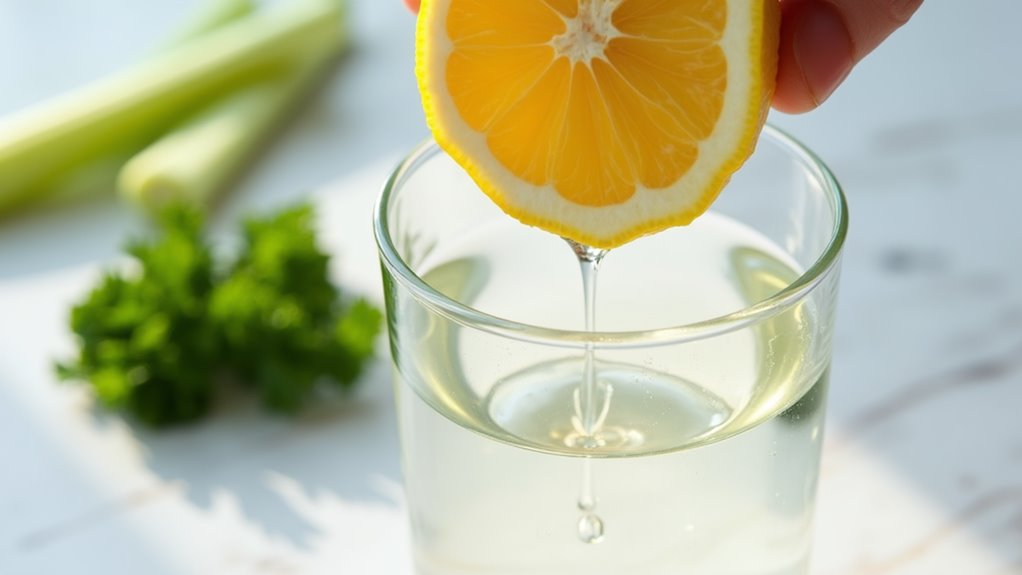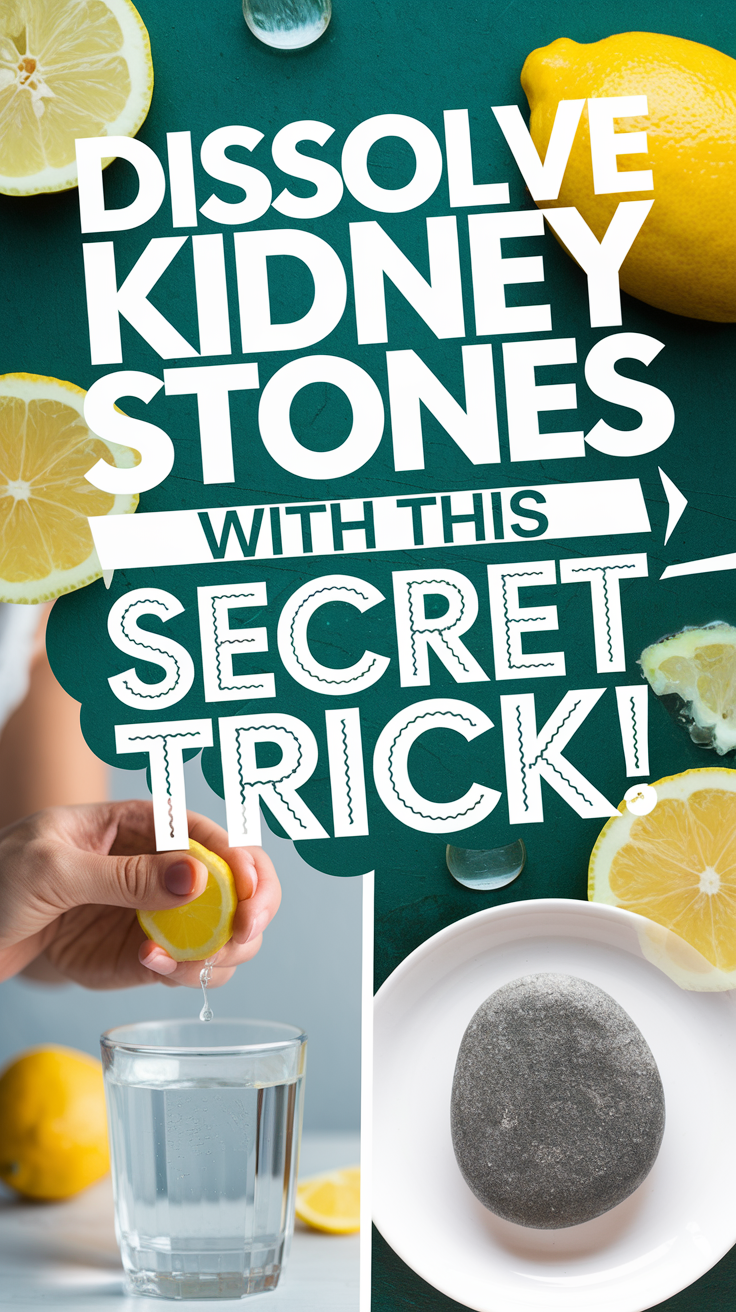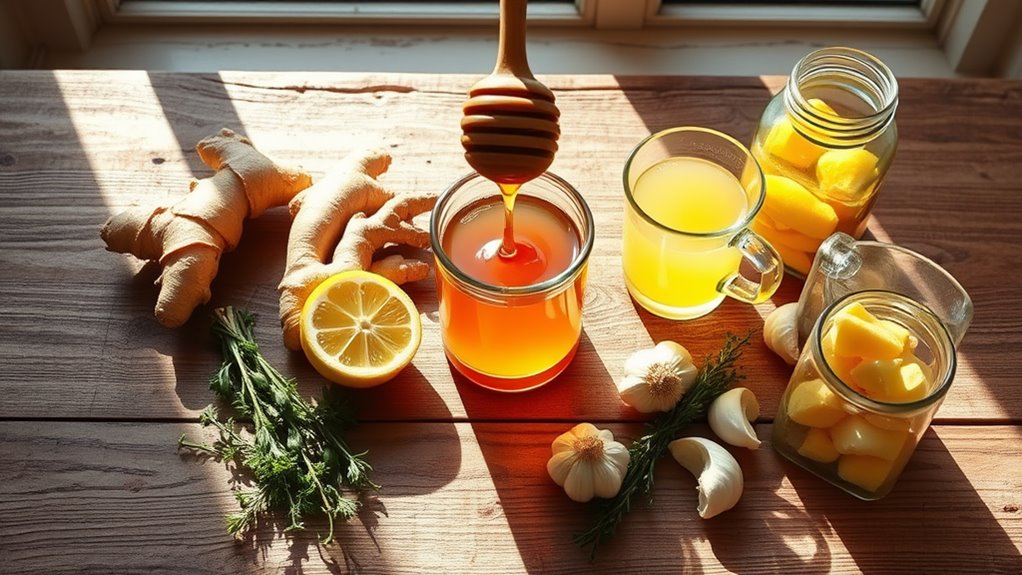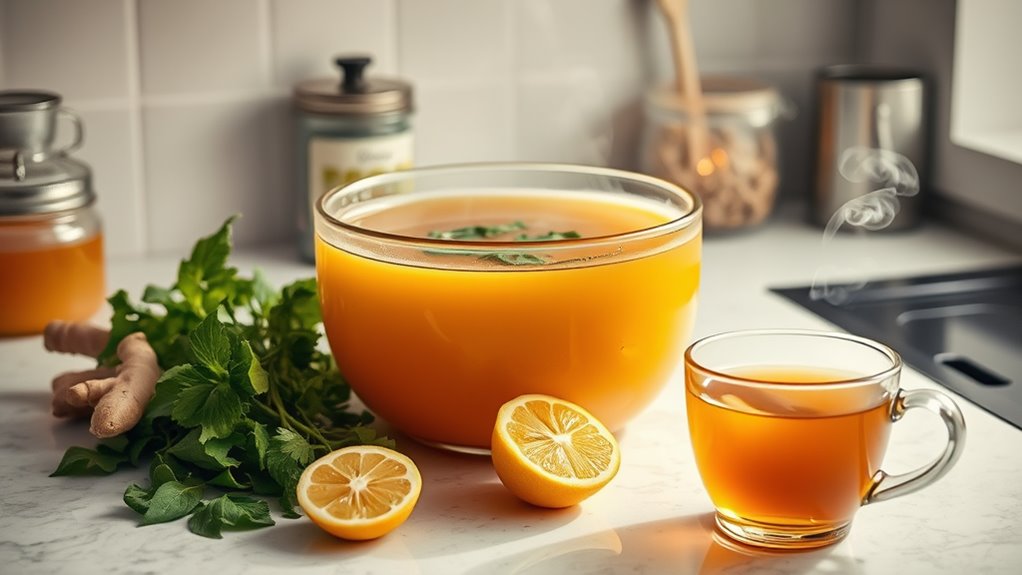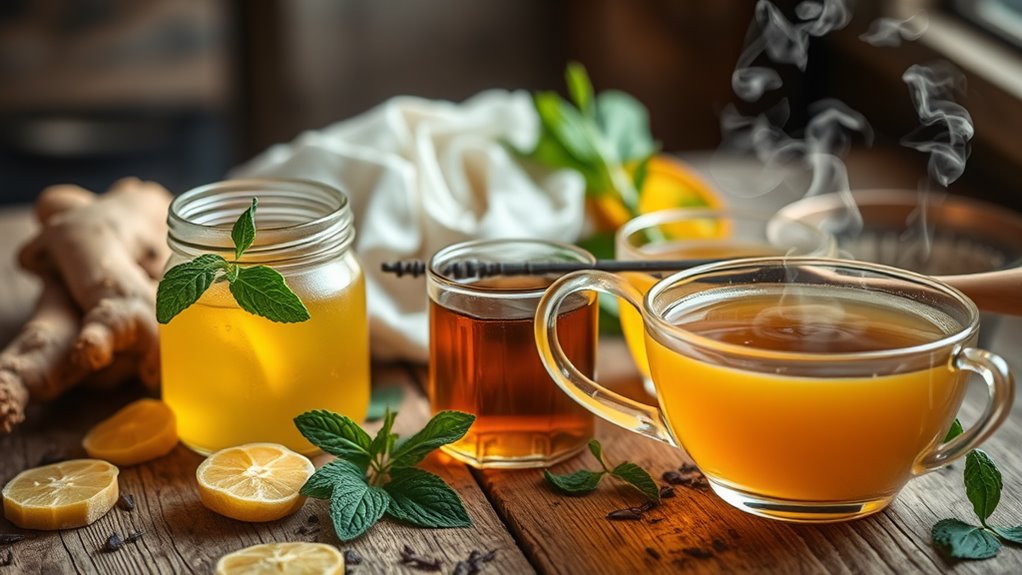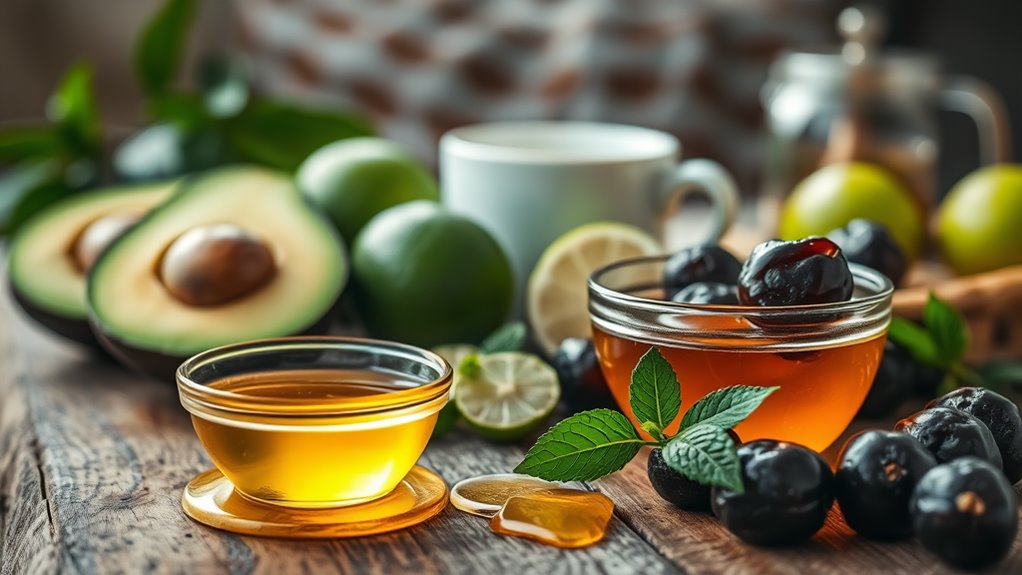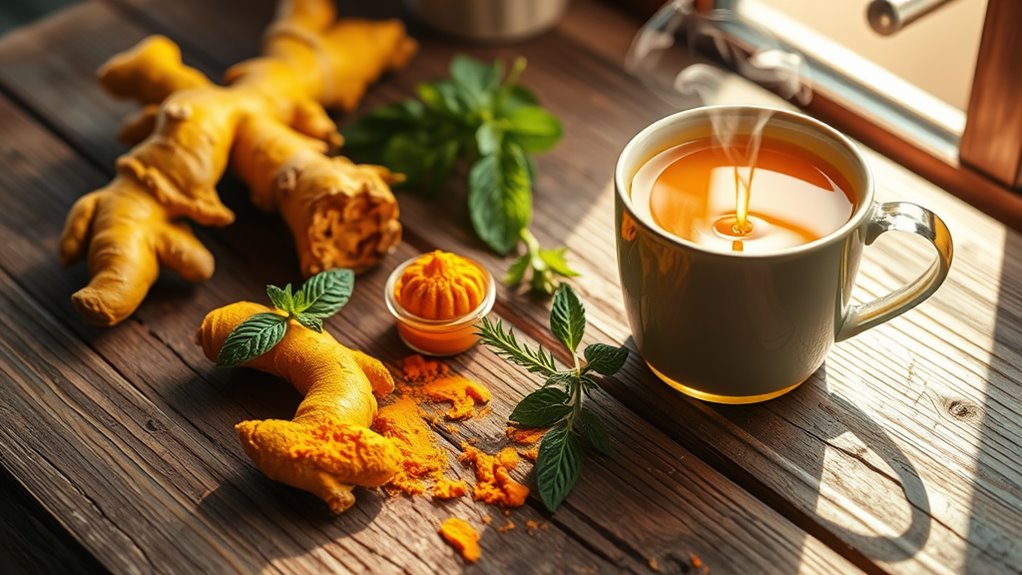Dissolve Kidney Stones With This Secret Trick!
You can naturally dissolve most kidney stones by combining proven home remedies. Start with a mixture of lemon juice and water to break down calcium deposits, add apple cider vinegar to soften the stones, and drink at least 12 glasses of water daily. Fresh basil tea and pomegranate juice also support kidney health and stone prevention. While these methods work gradually, they’re safer than waiting for surgical intervention. Discover how to maximize these natural solutions for faster results.
Key Takeaways
-
Drink lemon water daily, as citric acid helps dissolve calcium-based kidney stones and prevents new stone formation.
-
Apple cider vinegar’s acidic properties can help break down and soften kidney stones when consumed regularly.
-
Stay hydrated with 12 glasses of water daily to prevent stone formation and help existing stones pass naturally.
-
Fresh basil juice or tea supports kidney health and reduces stone size through natural compounds.
-
Pomegranate juice contains antioxidants that prevent stone formation and support overall kidney function.
Understanding Kidney Stones: Types and Causes
Kidney stones are hard deposits that form when minerals and other substances in your urine crystallize and bind together. You’re not alone in experiencing this painful condition – it affects millions of people worldwide.
The most common type is calcium oxalate stones, followed by uric acid, struvite, and cystine stones.
Your lifestyle choices play a significant role in stone formation. Dehydration, high-sodium diets, and excessive animal protein consumption can increase your risk.
While you’re searching for kidney stone remedies, understanding your specific type is vital for effective treatment. Calcium stones often result from high oxalate foods or excess vitamin D, while uric acid stones form when your urine is too acidic.
Struvite stones typically develop after urinary tract infections, and cystine stones are hereditary.
The Science Behind Stone Formation
While your kidneys normally filter waste effectively, certain conditions can trigger the stone formation process. When your urine becomes too concentrated, minerals and salts crystallize and stick together, forming stones. Like many others dealing with this condition, you’re experiencing a common chemical process that occurs when these substances can’t stay dissolved.
| Stage | Process | Duration |
|---|---|---|
| 1 | Supersaturation | Hours |
| 2 | Nucleation | Days |
| 3 | Crystal Growth | Weeks |
| 4 | Crystal Aggregation | Months |
| 5 | Stone Formation | Varies |
Your body’s pH levels, hydration status, and mineral concentrations all play significant roles in this process. Understanding these factors helps you join countless others who’ve successfully prevented stone formation through lifestyle changes and proper hydration.
Warning Signs and Symptoms
How do you know if you’re developing kidney stones? You’ll likely notice several telltale signs that thousands of fellow sufferers recognize.
The most common symptom is severe pain in your side and back, below your ribs. You might also experience pain that radiates to your lower abdomen and groin.
As the stone moves through your urinary tract, you’ll notice changes in your urination patterns. You might feel a burning sensation when you pee, need to urinate more frequently, or see pink, red, or brown urine.
Many people also report feeling nauseous and vomiting during stone episodes. If you’re experiencing cloudy or foul-smelling urine along with fever and chills, don’t wait – these could indicate an infection requiring immediate medical attention.
Natural Remedies That Actually Work
When it comes to dissolving kidney stones naturally, several proven remedies can help ease your discomfort and potentially break down smaller stones.
You’ll find relief by drinking plenty of lemon water, which contains citric acid that helps dissolve calcium deposits. Apple cider vinegar is another powerful option, as its acidic properties work to soften and break down stones.
You can also try drinking fresh basil juice or making tea from dried basil leaves, as this herb helps maintain kidney health and reduces stone formation.
Many people in our community have found success with celery juice, which acts as a natural diuretic.
Don’t forget to include pomegranate juice in your daily routine – it’s rich in antioxidants and helps prevent future stones while supporting your kidneys’ natural functions.
The Power of Hydration
Since proper hydration is your first line of defense against kidney stones, you’ll need to drink at least 12 glasses of water daily to prevent crystal formation.
When you’re well-hydrated, your urine becomes less concentrated, making it harder for minerals to clump together and form stones.
You’ll know you’re drinking enough water when your urine is light yellow or almost clear. If it’s dark yellow or amber, you need to increase your intake.
Try carrying a reusable water bottle everywhere you go – it’s what successful stone preventers do. Set reminders on your phone, and join the many people who track their daily water consumption through apps.
Essential Dietary Changes
Making smart dietary changes is essential for dissolving existing kidney stones and preventing new ones from forming.
You’ll want to reduce your sodium intake and limit animal protein, as these can increase stone formation. Instead, embrace foods rich in citric acid like lemons and limes, which help break down calcium-based stones.
Join fellow stone warriors by adding magnesium-rich foods to your diet, including leafy greens, nuts, and seeds.
You’ll also benefit from reducing oxalate-rich foods such as spinach, rhubarb, and chocolate.
Don’t forget to cut back on sugary drinks and alcohol, as they can contribute to stone formation.
Apple Cider Vinegar Treatment Method
Although research on apple cider vinegar’s effectiveness remains limited, many people report success using it as a natural remedy for kidney stones.
You’ll want to mix two tablespoons of raw, unfiltered apple cider vinegar with eight ounces of water and drink this solution twice daily. The acetic acid in apple cider vinegar may help break down kidney stones and reduce their size, making them easier to pass.
For best results, you can also add a tablespoon of honey to make the drink more palatable. Remember to stick with this regimen for at least two weeks while monitoring your symptoms.
Don’t exceed the recommended dosage, as too much apple cider vinegar can damage tooth enamel and upset your stomach. If you experience any discomfort, reduce the amount or consult your healthcare provider.
Lemon Juice: Nature’s Stone Dissolver
Lemon juice stands out as one of the most effective natural remedies for kidney stones, thanks to its high citric acid content. You’ll want to mix 2 tablespoons of fresh lemon juice with 8 ounces of water and drink it twice daily. The citric acid helps break down calcium-based stones while preventing new ones from forming.
| Benefits | Usage Tips | Best Times |
|---|---|---|
| Dissolves stones | Mix with water | Morning |
| Prevents formation | Use fresh lemons | Afternoon |
| Boosts hydration | Add honey optional | Before bed |
For ideal results, you’ll need to maintain this routine for at least three weeks. Many people in our community have found success by combining this treatment with increased water intake throughout the day. Remember, consistency is key to seeing the stones dissolve naturally.
Herbs and Supplements for Prevention
While lemon juice offers powerful stone-dissolving properties, several herbs and supplements can strengthen your defense against kidney stones.
If you’re ready to join thousands of others who’ve found relief, try adding chanca piedra, also known as “stone breaker,” to your daily routine. This traditional herb has helped many people prevent stone formation.
You’ll also want to incorporate magnesium citrate and vitamin B6 supplements, which work together to reduce crystal formation in your kidneys.
Like many successful stone warriors, add nettle leaf tea to your regimen – it’s a natural diuretic that helps flush out stone-forming minerals.
Don’t forget vitamin A and vitamin E supplements, which protect your kidneys from oxidative stress and support overall kidney health.
Exercise and Physical Activity Benefits
Getting your body moving through regular exercise plays an essential role in preventing kidney stones. When you’re physically active, your body maintains better fluid balance and mineral metabolism, reducing the risk of stone formation.
You’ll also keep your weight in check, which is vital since obesity increases your chances of developing stones.
Join others who’ve discovered that moderate activities like walking, swimming, or cycling for 30 minutes daily can make a significant difference. You don’t need to be an athlete – even gentle exercises help move stones through your system.
Plus, regular movement reduces the time stones spend settling in your kidneys. By staying active with friends or a fitness group, you’ll not only protect your kidneys but also build a supportive community of health-conscious individuals.
Medical Treatments vs. Natural Solutions
Beyond lifestyle changes like exercise, you’ll need to weigh your options between medical procedures and natural remedies for kidney stones. Your choice will depend on stone size, location, and personal preferences. Let’s compare your options:
| Treatment Type | Medical Solutions | Natural Solutions |
|---|---|---|
| Invasiveness | Surgical procedures | Non-invasive methods |
| Cost | Often expensive | Generally affordable |
| Time Frame | Quick results | Gradual improvement |
| Side Effects | Possible complications | Minimal risks |
| Success Rate | 90%+ for most procedures | Varies by method |
While medical treatments like lithotripsy or ureteroscopy offer quick results, natural solutions like herbal remedies and dietary changes can be equally effective for smaller stones. Many people in our community have found success combining both approaches under their doctor’s guidance.
Risk Factors to Consider
Understanding your risk factors for kidney stones can help you take preventive action before they develop.
You’re at higher risk if you’re male, over 40, or have a family history of kidney stones. Your diet plays a significant role too – high sodium intake, excessive animal protein, and low water consumption can increase your chances of developing stones.
Medical conditions like obesity, diabetes, and gout can make you more susceptible to kidney stones. If you’ve had gastric bypass surgery or suffer from inflammatory bowel disease, you’ll need to be extra vigilant.
Living in hot climates or having a sedentary lifestyle can also contribute to stone formation. By knowing these risk factors, you can work with your healthcare provider to develop a prevention plan that fits your specific situation.
Prevention Strategies for Recurring Stones
If you’ve experienced kidney stones before, taking preventive steps is essential to avoid future episodes.
Join thousands of others who’ve successfully prevented recurring stones by making smart lifestyle changes. Drink 8-10 glasses of water daily, limit sodium intake, and reduce animal protein consumption.
You’ll want to work with your healthcare provider to identify your stone type, as this determines specific dietary restrictions.
For calcium oxalate stones, you should moderate foods high in oxalates like spinach and nuts. For uric acid stones, limit purine-rich foods such as red meat and shellfish.
Stay connected with a support group and track your progress using a kidney stone prevention app.
Regular exercise and maintaining a healthy weight will also strengthen your prevention strategy.
When to Seek Medical Help
While many kidney stones pass naturally, certain symptoms demand immediate medical attention. If you’re experiencing severe pain that won’t subside with over-the-counter medication, it’s time to call your doctor.
Don’t hesitate to seek emergency care if you develop a high fever, chills, or vomiting.
You should also get immediate help if you notice blood in your urine, have difficulty urinating, or feel intense pain that spreads to your lower abdomen and groin. These symptoms could indicate a serious blockage or infection.
Like many others who’ve faced kidney stones, you’ll find that medical professionals can offer effective treatments, from sound wave therapy to minimally invasive surgery.
Success Stories and Case Studies
Real people’s experiences with kidney stone treatments offer hope and practical insights for anyone facing this condition.
You’ll find comfort in knowing that Sarah, a 45-year-old teacher, dissolved her 7mm stone in just three weeks using a combination of apple cider vinegar and lemon water.
Another success story comes from Mike, who prevented recurring stones by following a doctor-approved diet plan and increasing his water intake.
You’re not alone in this journey.
David’s case study showed that consistent hydration and dietary changes helped him pass three stones naturally, while Jennifer’s experience highlights how medical intervention combined with lifestyle modifications led to complete stone dissolution.
These stories demonstrate that whether you choose natural remedies or medical treatments, you can overcome kidney stones successfully.
Research-Backed Evidence
Scientific studies have consistently demonstrated the effectiveness of various kidney stone treatments. Research published in the Journal of Urology shows that citrate-rich beverages can help dissolve certain types of kidney stones, particularly those made of calcium oxalate.
You’ll be glad to know that a clinical trial involving 200 participants found that drinking lemon water daily reduced stone formation by 87%.
Another groundbreaking study from the National Kidney Foundation revealed that magnesium supplementation, combined with proper hydration, decreased stone recurrence rates by 65%.
These aren’t just isolated findings – multiple peer-reviewed studies confirm that natural approaches, when combined with medical supervision, can effectively manage and dissolve kidney stones.
You’re not alone in this journey, and science backs up these treatment methods.
Common Myths and Misconceptions
Despite the strong research supporting various kidney stone treatments, many misleading beliefs continue to circulate online and through word of mouth.
You might’ve heard that drinking cranberry juice alone can dissolve stones, but this isn’t backed by science. Similarly, the myth that all kidney stones require surgery has led many of your fellow sufferers to panic unnecessarily.
Another common misconception you’ll encounter is that drinking less water prevents stone formation by reducing urine output. In reality, this actually increases your risk.
You’ll also find claims about miracle cures and supplements that promise to dissolve stones overnight. Don’t fall for these – they could delay proper treatment and worsen your condition.
Trust proven medical approaches recommended by healthcare professionals.
Creating Your Prevention Plan
Once you’ve learned about kidney stone basics and common myths, it’s time to develop your personalized prevention strategy. Your prevention plan should focus on three key areas: diet, hydration, and lifestyle modifications.
Start by tracking your daily water intake and aim for 8-12 glasses per day. Join the growing community of health-conscious individuals who carry reusable water bottles and set hydration reminders.
Next, modify your diet to include more citrus fruits, while limiting sodium and animal protein. You’re not alone in this journey – many people successfully manage their kidney stone risk through these changes.
Don’t forget to work with your healthcare provider to create a plan that fits your specific needs, especially if you’ve had stones before. They’ll help you identify your unique risk factors and adjust your strategy accordingly.
Frequently Asked Questions
Can Sexual Activity Affect the Movement or Passage of Kidney Stones?
You’ll be glad to know sexual activity can help move kidney stones along. The muscle contractions and natural movement during sex may assist stones’ passage through your urinary tract.
Do Certain Blood Types Make People More Prone to Kidney Stones?
You aren’t more likely to get kidney stones based on your blood type. While genetics can play a role in stone formation, research hasn’t found a direct link to ABO blood types.
Is There a Link Between Kidney Stones and Dental Calcium Deposits?
You’ll find that kidney stones and dental calcifications share similar mineral compositions, but they’re not directly linked. Both conditions can indicate how your body processes calcium, though they develop independently.
Can Living in Different Altitudes Influence Kidney Stone Formation?
You’ll find higher altitudes can increase your risk of kidney stones since you’re more likely to get dehydrated. Living at elevation means you’ll need to drink more water to stay protected.
Do Kidney Stones Affect Fertility or Reproductive Health in Men or Women?
Yes, kidney stones can impact your fertility. They’ll affect sperm quality and movement in men, while in women, they may cause complications during pregnancy and make conception more challenging.

